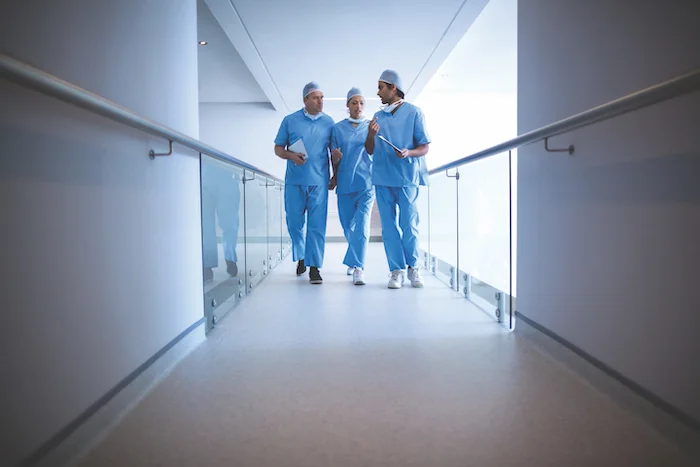News & Articles

Multidisciplinary Cancer Care: What Is It & Why It Matters?

“We need to work better together,” says Dr Ang Peng Tiam, Parkway Cancer Centre’s Medical Director and Senior Consultant Medical Oncologist. In this interview, the veteran cancer specialist explains the importance of multidisciplinary teams in cancer management, and why this collaborative approach is key to achieving the best outcomes for patients with cancer.
Cancer care is a field in Medicine that is constantly and rapidly evolving. As treatments become more complex with advances in therapeutics and technology, the focus of cancer care has shifted from pure disease management to a more holistic, multidisciplinary approach that addresses different points of care for each individual patient.
“In the past, it was a question of ‘who sees the patient first’,” Dr Ang elaborates. “But we now acknowledge that the sequence of treatment matters. A breast cancer patient sees a surgeon as the first point of contact, but a discerning surgeon may sometimes encourage the patient to see a medical oncologist for upfront treatment.
“As we begin to understand more and more about each patient and their cancer, we realise that we need to collaborate and work better together, not just between the 3 main specialists (medical oncologist, surgeon, radiation oncologist), but also extending it to the pathologist, radiologist, rehabilitative nurse, psychologist, dietitian, and so on.”
Multidisciplinary teams in cancer management
Dr Ang shares that whereas traditionally, doctors work in silos within their own specialities, this multidisciplinary care calls for better collaboration and communication across different specialties.
Radiology, for instance, is key in helping establish whether a patient’s cancer has spread. Modern developments such as the PET-CT, for instance, can help stage the disease more accurately, allowing doctors to make better treatment decisions for the patient.
Pathologists play a pivotal role in guiding doctors on possible treatment modalities based on the molecular genetics of the cancer, as genetically distinct diseases require different therapeutic approaches.
For example, stage 4 lung cancer patients, who carry a particular genetic mutation such as EGFR, can be treated with an oral targeted agent instead of undergoing chemotherapy.
Plastic surgeons may also get involved in the case of breast reconstruction for patients who need to undergo mastectomy, while dietitians, rehabilitative nurses and counsellors are key in helping patients manage the more social and lifestyle aspects of cancer treatment.
Towards better treatment outcomes
“A multidisciplinary approach is important because the patient is no longer treated like a ‘football’ that is kicked from one doctor to the next,” expressed Dr Ang.
“Rather, the multidisciplinary team decides together what would be the most appropriate and effective combination of treatment for the patient and their disease, providing what we call patient-centric care.”
The result of such collaboration is better outcome for the patient, explains Dr Ang.
For example, if a surgeon were to operate on a HER2-positive breast cancer patient with a 5 cm breast tumour, they may have to consider removing the entire breast.
However, with a multidisciplinary team, the patient may only require chemotherapy with anti-HER2 agents to shrink the tumour to a small size, allowing for a wide excision to be carried out, preserving the breast and hence providing better cosmetic outcomes for the patient, without compromising cure rates.
If you are a patient, the option of seeking a second and even third opinion should be kept in mind if your doctor only confines the discussion to a single modality of treatment, Dr Ang advises.
“Most doctors who treat cancer will describe the role of the different modalities (surgery, chemotherapy and radiation) for you to consider
so that you can have a comprehensive understanding of the treatment options available for you.”
The future of multidisciplinary care
Multidisciplinary cancer care encourages collaboration within the team, often resulting in better patient care and outcomes. The treatment options available often evolves alongside advances in surgical techniques, discovery and development of new drugs, and medical equipment.
“The truth of it is that we [Parkway Cancer Centre] started very small.
“We started as general medical oncologists, but today, there is greater subspecialty development even within our company,” shares Dr Ang. “We now have medical oncologists who subspecialise in lung cancer, breast cancer, gastrointestinal cancer, leukemia, lymphoma, sarcoma and so on. We have also included dietitians, counsellors and oncology-trained nurses amongst others into the team, gradually incorporating them into PCC so that we can provide more holistic care for our patients.
He added that, “Through public education as well as better collaboration amongst our oncologists and other specialists in the hospital, we want to make multidisciplinary care the standard of care.
“That would be our long-term goal: for every patient with cancer to be able to enjoy the benefits of seamless multidisciplinary care.”
| POSTED IN | Cancer Treatments |
| TAGS | breast cancer, cancer counsellor, cancer mutation, cancer nurse, chemotherapy, lung infection, mastectomy, radiotherapy (radiation therapy) |
| READ MORE ABOUT | Breast Cancer, Leukaemia, Lung Cancer, Lymphoma, Sarcoma, Stomach Cancer |
| PUBLISHED | 08 June 2021 |
